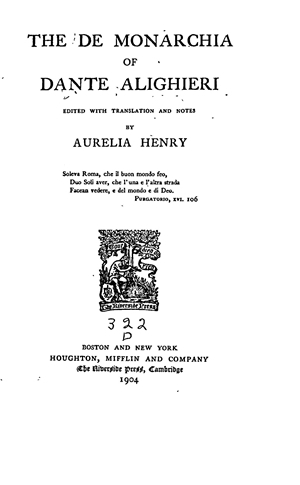
De Monarchia
- Dante Alighieri (author)
- Aurelia Henry Reinhardt (translator)
The great Italian poet turns his hand to political thought and defends the reign of a single monarch ruling over a universal empire. He believed that peace was only achievable when a single monarch replaced divisive and squabbling princes and kings. However, he also believed in a separation of powers in that the Emperor has jurisdiction over temporal matters, whilst the Pope administered over things spiritual.
Key Quotes
War & Peace
It has now been satisfactorily explained that the proper function of the human race, taken in the aggregate, is to actualize continually the entire capacity of the possible intellect, primarily in speculation, then, through its extension and for its sake, secondarily in action. And since it is true…